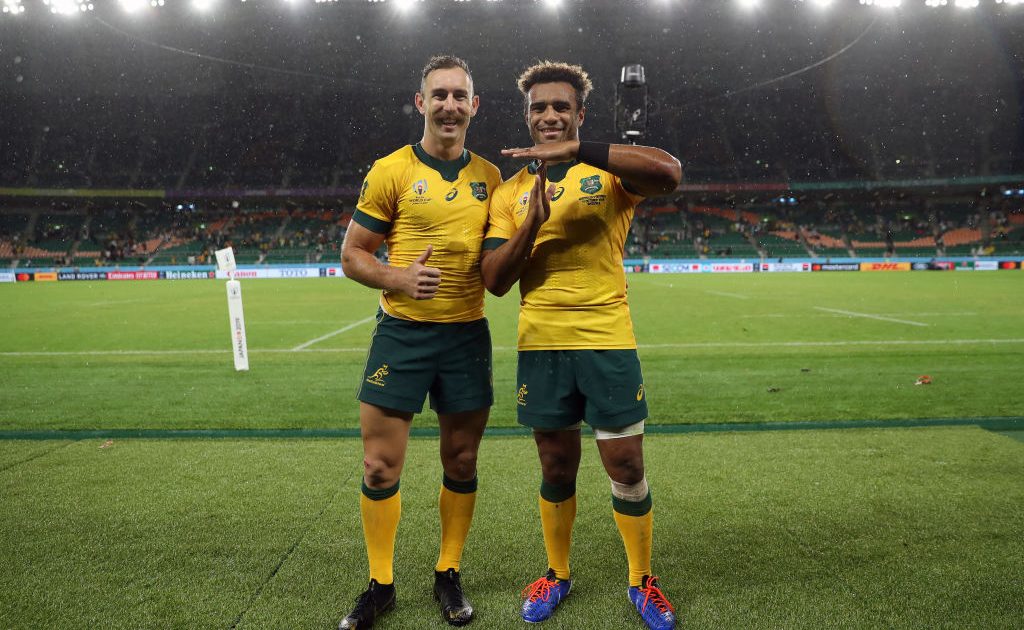'It makes a big difference': Who Will Genia would start at scrum half for Australia

Will Genia has revealed who he would want to start at scrum half for Australia in a big Test match, as he believes one player is better suited to the “Wallabies structure.”
Queenslander Tate McDermott was given the first opportunity on the spring tour to start in Wallaby gold last weekend, and looked dangerous with the ball-in-hand.
McDermott made a 20+ metre break out of nowhere inside the opening few minutes, and generally appeared to have the Scottish defence second guessing themselves before going off.
The 24-year-old Queensland Reds scrum half left the field for a HIA mid-way through the second half after a controversial clean-out from Scotland replacement Glen Young.
Nic White, who played his 50th Test in July, came onto the field and played a crucial role in the Wallabies’ dramatic win.
Not only was White’s passing and kicking game quite accurate, but he ended the game with a brilliant showing of skill as he dropkicked the ball into touch on the bounce the end the match.
Test veteran and former Wallaby scrum half Genia believes White is the better option to start in the No. 9 jersey for Dave Rennie’s team.
“If I was pressed on who I had to start, say if it’s a big game and a big Test match, I’m probably going to start Whitey,” Genia told the Roar Rugby Podcast.
“I’d rather try and win the game from the outset then bring someone on who can win it when we’re doing 15-6 as the example.
“Whether this is right or wrong to say, I think Whitey plays to the current Wallabies structure and the way they want to play the game better than the other two.
Skelton joined the Wallabies squad ahead of their Test against France at Stade de France this weekend. #FRAvAUS https://t.co/QxLu5samYb
— RugbyPass (@RugbyPass) November 2, 2022
“It just seems like he understands the game style and game plan more, and it allows him to make better decisions and read the play and read the cues.
“Like I said, if I was pressed I would choose him. Again to be fair, Whitey has had a really good impact off the bench, he’s also been very, very good when he’s started games for us.”
A rugby team’s scrum half is the player that touches the ball the most out of anyone on the field, and is usually plays a pivotal role in success or failure.
The best teams in the world have some of the best No. 9’s, including French captain Antoine Dupont who won World Rugby Player of the Year in 2021.
But as Genia explained, the skillset that a scrum half has can make “a big difference” on how a team plays the game.
“If say for example you have a running nine, the game essentially has to cater to him a little bit,” he also mentioned.
“Not a lot because obviously the team comes first, or you have a classical nine say like a Whitey who (has a) excellent pass, excellent kick. Again, the game caters to how he fits into it more.
“Faf de Klerk, he’s a bit of a rover and he’s a little bit similar to Dupont in that he likes the physical stuff, he’s a good support player and things like that.
“It makes a big difference in how you want to play the game.”
The Wallabies got their five-game spring tour off to an ideal start, recording a tense 16-15 win over Scotland at Murrayfield.
Flyhalf Blair Kinghorn sent a penalty attempt at goal wide left in the final minute.
Next up for Australia is a trip to Stade de France where they’ll play Dupont’s Les Bleus on Sunday morning (AEST).
















